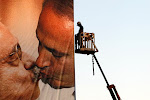Sudanese Migrants' Exodus to Israel
 Hundreds of Sudanese migrants who have crossed the southern desert on foot into Israel now are imprisoned in the so-called Promised Land. And, despite Israel’s pledge to evaluate each case individually, 48 new arrivals were summarily expelled this month immediately after they were caught. The trickle of mostly Muslim asylum-seekers from Africa has become a flood and created a crisis of conscience inside Israel, where security concerns routinely override compassion. Al-Qaeda is active in the Sudan, and this raises alarms.
Hundreds of Sudanese migrants who have crossed the southern desert on foot into Israel now are imprisoned in the so-called Promised Land. And, despite Israel’s pledge to evaluate each case individually, 48 new arrivals were summarily expelled this month immediately after they were caught. The trickle of mostly Muslim asylum-seekers from Africa has become a flood and created a crisis of conscience inside Israel, where security concerns routinely override compassion. Al-Qaeda is active in the Sudan, and this raises alarms.
Some Israelis argue that,after the horrors of the Nazi genocide in Europe, it is morally reprehensible for Israel’s Jews to turn away people fleeing from persecution. Memories of relatives who were refused asylum in the 1930s and sent back to be part of the Final Solution are still excruciating. Around 70 desperate Africans sneak across Israel's barren southern border every night to seek refuge among sympathetic Jews.
But pragmatic politicians warn that Israel, with its population of 7 million, could soon be engulfed by up to 3 million Sudanese. The majority fled from the brutal savagery of civil war and drought-ravaged lands years ago and now seek a softer life in Israel; they want to escape racist abuse and maltreatment in Egypt.
“Israel puts these people at grave risk by expelling them with no proper procedure and no indication of Egypt’s willingness to accept them,” warned Bill Frelick, the refugee policy director for Human Rights Watch. Many have escaped from war-blighted Darfur, travelled north through Chad or Egypt, and had hoped to remain temporarily in Israel until resettled in a third-country.
Sending an illegal migrant back to Sudan after he has visited Israel, an enemy nation, is tantamount to a death sentence.
Last month, the Israeli Prime Minister Ehud Olmert promised asylum to 500 refugees who escaped the horrors of Darfur, but the burgeoning numbers have numbed public sympathy. Government spokesman David Baker clarified that “The policy of returning back anyone who enters illegally will pertain to everyone, including those from Darfur.” Olmert insists that President Hosni Mubarak personally assured him Egypt will safeguard Sudanese who are sent back; but concerns heightened after a tv interview with an Israeli soldier who witnessed Egyptian troops beating and shooting dead four Sudanese refugees trying to slip across the border on August 1st.
Mustafa, a laborer who fled Darfur six years ago and was unhappy living in Cairo, has been under ‘house arrest’ on an Israeli kibbutz for the past year, earning a wage to send home to his relatives in Sudan while his case is reviewed. Other African ‘prisoners’ are assigned jobs at beach resorts in Eilat. Workers are needed to replace the Palestinians now prevented from reaching their jobs by checkpoints and the security wall. Though prohibited from leaving the workplace, Sudanese refugees manage to earn reasonable salaries inside Israel. Word has spread, not by bush telegraph but by cell phone. In 2004 the the United Nations registered just five Sudanese here; Until 2006, with the intifada at full tilt, few asylum seekers would consider Israel. Now, sixty or seventy refugees cross into Israel each night; activists estimate that at least 3000 are inside the country.
Mustafa , age 31, dreads the day he gets deported. He still has nightmares after Egyptian immigration police locked him up for ten days in a cramped jail because he had no documents. “That place is unimaginable,” he recalled recently. “Fifty of us were curled up, very hot, like cooking meat, and everybody was smoking, shouting....It ‘s difficult for a human being to endure vermin crawling over you while you are still alive.”
At great risk, Mustafa took a hand-drawn map of Sinai and set out alone for Israel, which he considers the first outpost of the West.
Bedouin smugglers are willing to spirit refugees across the 132 mile-long frontier, along with prostitutes and drugs, but they can charge able-bodied men $1000 a head. Women pay $600.
Mustafa trekked alone all night through dunes and scrub, but he neglected to bring any drinking water. By journey’s end, his thirst drove him to turn himself in at an Israeli checkpoint. “When I thought of the water, I forgot everything,” he admitted, Israeli soldiers are under orders to arrest stray illegals they encounter in the desert. Security forces and police must make sure illegal aliens get a medical check-up for dehydration before rounding them up and locking them away in Khetziot Prison, a remote desert jail close to the Egyptian border. Men are kept apart from their families here.
Few of the Sudanese women prisoners planned on a permanent move to Israel, observed Anat Hoffman, director of the Israel Religious Action Center,a Reform organization which has launched an outreach program to African refugee families. “They’ve heard so much about Israel in the news, they imagine it’s a huge place, maybe not quite so big as Europe, but just as important," she said. "No one wants our free Hebrew-Arabic dictionaries; they prefer to learn English and eventually to end up in America. They think of the US as the magic place where people of color have a chance. Condi Rice seems like some powerful black queen to them.“
"No one can expect that Israel alone can be the solution for all the Darfur refugees, and we urge the international community to act decisively. Israel is willing to play her part in the framework of international efforts," a Foreign Ministry statement spelled out. A single Messianic Jew in the Negev has erected shelter for 50 Sudanese refugees, according to the Economist.
In contrast to the government's dithering, many private Israelis have been generous. A Jerusalem-based religious group seeks to help the small minority of non-Muslim refugees who, if deported to an Arab country, would come under intense pressure to convert. Christian Sudanese refugees are at particular risk. Egyptian interrogators acting under Sudanese security service supervision routinely torture them to extract intelligence about who else might be reverting to Christianity.
Charmaine Hedding, a spokeswoman for the Christian Embassy, a pro-Zionist Evangelical group, suggested that a number of churches in America would welcome Sudanese Christians sent on from Israel. "Let us relocate these people; 1,000 people is manageable," she said.
Meanwhile, while volunteers try to firm up the arrangements, another seventy desperate Sudanese will evade Egyptians and slip through the desert border into Israel every night.
NOTE: UNRWA officials asked that names be disguised to protect the refugees while their status is determined. Guest post, copyright Jan McGirk, 08/21/2007
.......





















































